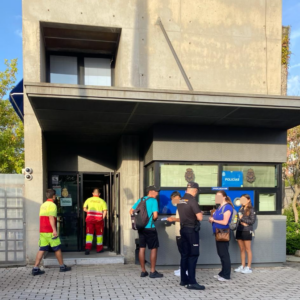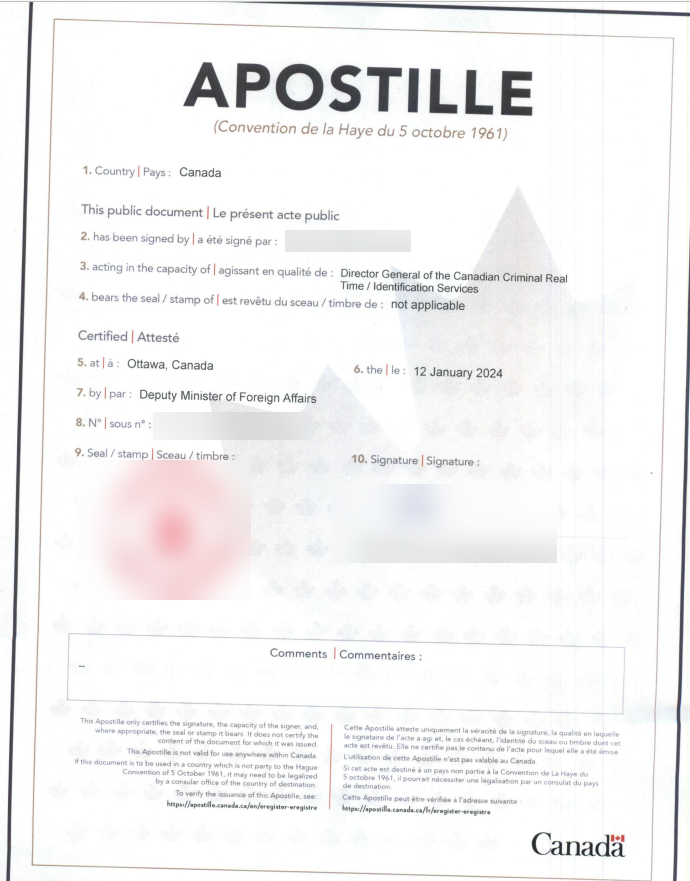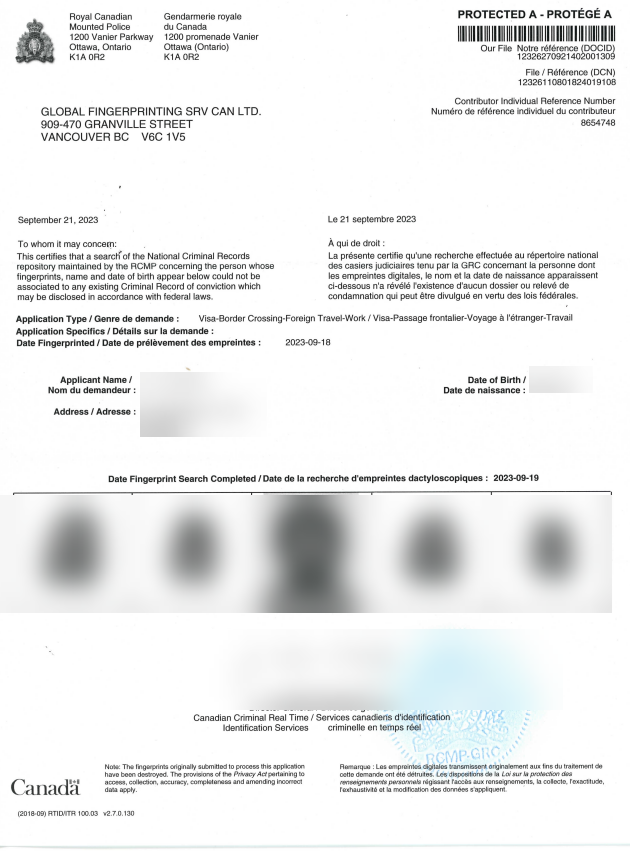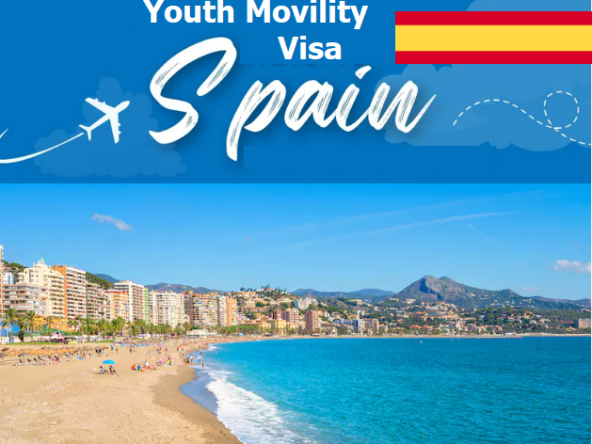This article breaks down the process of getting a criminal record for use in Spain and my personal experience undergoing this process.
Please note that there has been some big changes with how documents are authenticated since January 11, 2024.
Getting the criminal record while in Canada
If you are in Canada and you need to provide a criminal record to take with you to Spain you will need to do a Police Check with the RCMP. Contact your nearest police station to ask if your fingerprints will be digital or ink rolled. Ultimately they will be sent to Ottawa for the background check before a criminal record document can be issued stating you have no criminal activity.
Please note that the criminal record has to be less than 6 months old by the time you submit your criminal record for visa processing.
Getting the criminal record while in Spain
Depending on your situation whether it is for study, marriage, civil partnership, or for work, you will need to provide a criminal record document for your Spanish paperwork.
If you are in Spain the first step would be to book an appointment in advance at your nearest Canadian consulate. There are three: Madrid, Barcelona, and Malaga.
The appointment will be to get an official introduction letter from the Spanish police in order to have your Canadian citizen’s fingerprints taken.
Instead of going to the consulate you could also request to get the introduction letter mailed to you, however to make it easier it is always better to go there in person.
Regardless of which consulate you book the appointment you will need to provide the following on your appointment date:
1) Valid Canadian passport
2) $60 CAD payment for the introduction letter which the Canadian officer will sign and stamp
3) RCMP’s C-216 form. I would recommend asking the officer to provide you 2 copies in case one gets lost or you need to redo your fingerprint again
I recommend when going to the Police office for fingerprints to bring a folder with you so you can store your fingerprint form and other documents so it won’t get lost or damaged.
Once you have the letter, the next step is to visit the local police. This is where it can get confusing so it’s worth mentioning here that you must go to the local police that is in partnership with the Canadian consulate. You are not booking an appointment with the local spanish authorities website. Instead you will go to the assigned location that the consulate will provide to you.
Madrid
Policia Cientifica (Dpto. de Resenas), Policia Nacional
Calle Julian Gonzalez Segador, s/n
28043 Madrid
Near Pinar del Rey metro station
This is a walk-in appointment and you do not need to make any reservations in advance. The fingerpirints are ONLY available Thursdays and you must sign in within a 15 minute time window (9:00-9:15am).
Malaga :
Policia Cientifica (Policia Nacional)
Plaza Manuel Azana 3
29006 Malaga
Monday to Friday from 9:00 to 14:00
Barcelona:
Policia Cientifica (Dpto. de Dactiloscopia)
Calle Guadalajara, 3
08006 Barcelona
Monday to Friday, from 9h00 to 14h00
*In Malaga and Barcelona the offices have more hours available
As of October 31, 2023 this is the information to contact the consulate or embassy of Canada for appointments:
Embassy of Canada in Madrid by booking a notarial services appointment online.
– Consulate of Canada in Barcelona by calling 93 270 3618 to make an appointment.
– Consulate of Canada in Malaga by calling 95 222 3346 between 10 am and 1 pm from Monday to Friday to make an appointment.
My experience at the Local police office fingerprint in Madrid
I can only share my experience in Madrid, but it was very smooth.
The Embassy of Canada in Madrid only has appointments available for getting the introduction letter on Mondays and if you are making a trip to Madrid from another city, it is best to stay in Madrid until the end of Thursday after you have gotten the fingerprinting done and RCMP C216 signed.
Feeling nervous I showed up to the office ahead of time because I was afraid of missing the 15 minute time window and not being allowed in for fingerprinting.
When you arrive the police ask you to scan your bags via security and then you provide your ID (you can show your TIE (expired or not) or your Canadian Passport. They then give you a Vista sticker with date stamped to put on your shirt. I was then told to wait outside. There were two people already there ahead of me. As we waited together I saw more and more show up and everyone that went inside to register and received a sticker went back out. The queue started to form longer and by 9:45AM we were ready to leave as a group.
I think there were at least 25 of us. The officer then told us to follow him to walk into another building which was 5 minutes away. As we entered the building we had to wait in a corridor. The early ones that arrived and were ahead in the line got a seat, while the others behind me had to stand in the hallway. There were 3 officers who were assisting us. We first had to fill out a form that they gave us. We had to fill out our details of our address were living and contact information. It was also the right time to fill out the RCMP C-216 form. This is where I mentioned earlier that having a second form as a backup would be easy in case you filled out the form incorrectly.
The officer then asked us to go inside the room if we were ready and at this point it didn’t matter the order of people going anymore because at the end we all had to wait for everyone to have their fingerprints done before we could head back.
The process was smooth and easy and I appreciated the professionalism and courtesy that the officers provided. They all spoke good English as well so communication was easy.
By 10:45AM we were all done and ready to head back.
WIth the completed and inked C-216 form completed, the next step is to research for a RCMP accredited company to have your fingerprint form digitize. The Canadian embassy would recommend you doing this before going to the police in Spain as some Canadian RCMP accredited companies may use their own form. However, I don’t believe this is necessary as there is a long list of places that will accept the C-216 form.
You can find the list here that will process the CCRTIS (RCMPs Canadian Criminal Real Time Identification Services)
There are several options you can choose and it depends on your budget as well as whether you would like to have someone in your family help you or you pay an agency to help you with getting the criminal record issued and authenticated.
If you money is not a worry to you and you would prefer having an agency take care of all of the service for you. I would recommend using Reliability Screening
Of course there are more you can choose, but I have heard great experiences with this agency and I do know of several Canadians who have went with this service and said positive things about them.
The service i think at the time I contacted them in summer of 2023 was around $500 CAD, pretty steep but they do get the job done:
I didn’t want to pay for the service and instead relied on my family to help me.
I contacted several places in Vancouver and Ottawa that help with digitalizing fingerprints and in general most cost around $200-$250. They require you to mail in one headshot photo of yourself with white background (passport photo size is fine) and a photocopy of 2 Canadian IDs that are notarized and stamped as certified true copy.
I found that was a bit of a hassle and luckily found one company Global Fingerprinting Services Canada that didn’t need me to provide a notarized copy. They were wonderful.
The digitization process takes about 1.5 weeks once they receive your fingerprinting form. They do not take care of the authentication part because they are not an immigration agency that helps with paperwork.
Once the criminal record was issued in Ottawa and sent back to the Global Fingerprinting Services Canada they forwarded the document to my parents address.

What to do with the criminal record?
Much of what follows in this paragraph is not relevant anymore, as the legalization process for Canadian documents have changed as of January 2024. When I applied to get the criminal record, Canada was still not part of the Hague Convention, which meant that I needed to get authentication from Global Affairs first before Embassy of Spain could legalize the document and make it valid to be used by Spanish authorities. However, with the new changes I recommend you still check with Global Affair’s website for updates, especially to see if your province where the criminal record is issued from or any document you need for Spain is listed under Global Affairs Canada. There are certain provinces where Global Affairs Canada will still take care of the authentication process. Link is found here.
It was a frustrating period for me when I had sent my criminal record for authentication with Global Affairs because the document that I sent took longer than expected to process by the authentication services department. Communicating with them via phone was completely impossible and email passable, but you would need to do a lot of following up to get someone to respond. My criminal record was sitting with the office for almost 3 months and finally Global Affairs had no choice but to authenticate it because as of January 11, 2024 Embassy of Spain or Consulate or Spain no longer takes part with the legalization of Canadian documents.
How to get the criminal record back
After getting an update from someone in Global Affairs Canada that my criminal record has been apostilled by them, I communicated with my lawyer who was handling my application for residency if the administration needed to have my original copy. I was glad to hear that they were fine getting a digital copy of the authenticated criminal record.
This was great for me as I was able to save money on more postage fees. I had spent probably spent over $100 in postage fees including having the criminal record mailed from Spain to Canada. I did have to pay to Canada Post for an online shipping label to give to Global Affairs, so they could send me back my authenticated criminal record along with the other documents and bank draft that was originally going to Embassy of Spain.
I do recommend if you have are getting your criminal record or any official Canadian documents needing authentication for Spain to check with your lawyer or the administration processing your application if they do need an original copy. If not, the process can be shortened. It worked the same for me when I also needed to provide my birth certificate and only a digital copy was used instead for my Pareja de hecho application. Do keep in mind that this criminal record needs to be translated into Spanish by a sworn translator. Depending on where you find a sworn translator, the prices can depend. I got my criminal record translated for 40 euros (VAT included) and another translator I reached out quoted me 55 euros. I went with the cheaper one instead.
About the new Apostille Convention in Canada
Up until January 11th 2024, Canada was not part of the Hague party to the Apostille Convention, which meant that all relevant official Canadian documents that are needed for Spain needed to be authenticated first by Global Affairs before getting it apostilled by the Spanish Consular /Embassy. However, all that has changed right now. If you recieved your criminal record and you need to figure out who and which party should apostilled your document please refer to the information found in the Global Affair link above. Global Affairs of Canada have reduced a lot of the apostilled work and will only accept certain provinces and certain government documents. If you were born from BC for example or received a university diploma from BC and you need to get the documents apostilled to be used for Spain, Global Affairs of Canada no longer will help you. You need to go to your own province authority to have them apostilled or get it notarized. More information is also found here.
There is updated information found on the link above which indicates which document Global Affairs of Canada will apostilled or not. The bottom line is that now with the new change taken into affect, Global Affairs will reduce the processing time for new applicants. They no longer need to go through two steps to get their documents first authenticated then apostilled by Spanish consulate/embassy in Canada. The apostilled will be done by the corresponding Canadian authorities depending on the origin and document type.
Here is the Criminal record Certificate that I finally got (I have blurred my personal details)…


To get the most updated information and to learn more about how to apostille a Canadian document, please refer to the website of Global Affairs Canada.
Disclaimer: The purpose of this article is to help Canadians their visa application and what is written here is for informational purposes only and may not be up to date according to the latest legislation. Therefore this article should not be intended as a substitute for professional advice. The information in this article should also not be used to replace the information found on the Spanish Consulate website.We strongly recommend checking any new and updated information on the Spanish Consulate website or contacting them at their consular offices. You can find the directory above.




